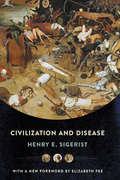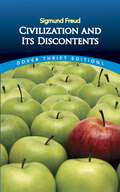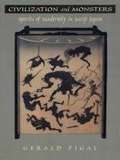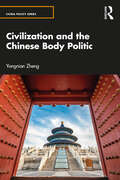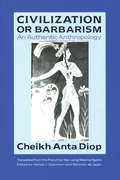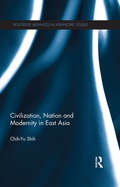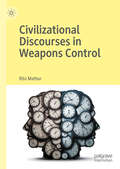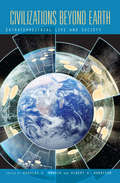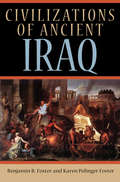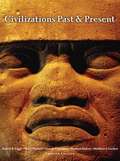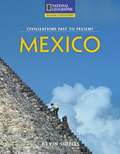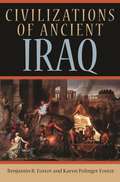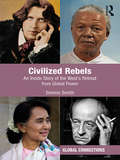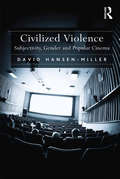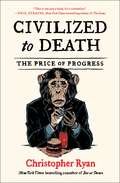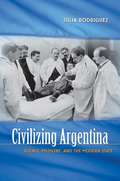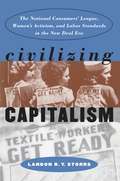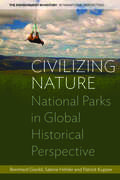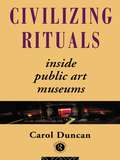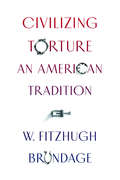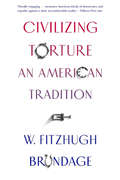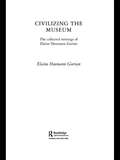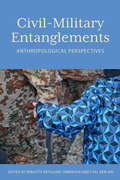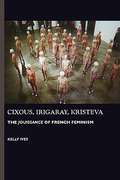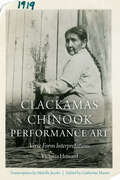- Table View
- List View
Civilization and Disease (Messenger Lectures)
by Henry E. SigeristOriginally published in 1943, Civilization and Disease was based on a series of lectures that the medical historian Henry E. Sigerist delivered at Cornell University in 1940. Now back in print, the book is a wide-ranging account of the importance of social factors on health and illness and the impact that disease has had on societies throughout human history. Despite considerable advances in both medicine and historiography, Civilization and Disease remains a landmark work in the history of medicine and a fascinating look at, first, civilization as a factor in the genesis and spread of disease, and second, the effects of disease on such aspects of civilization as economics, social life, law, philosophy, religion, science, and the arts. In a new foreword written for this edition, Elizabeth Fee outlines Sigerist’s life, works, and legacy as a historian, a teacher, and an advocate for universal health care, hailing Civilization and Disease as "an excellent introduction to Sigerist’s work."
Civilization and Its Discontents
by Sigmund Freud Joan RiviereThe struggle between the urgencies of instinct and the restrictions of civilization is addressed throughout the works of Sigmund Freud, and in Civilization and Its Discontents the theme is developed with particular richness and depth. This famous study explores the guilt that arises when personal desires clash with social norms, and it examines attempts to reconcile the conflict.In a sense, such guilt is among civilization's building blocks, keeping aggressive and selfish instincts within bounds. But it can also be a source of great frustration, and Freud examines at length many ways of dealing with guilt, from artistic and scientific pursuits to abuse of drink and drugs. The great psychologist offers revealing insights into the motivation behind human behavior as well as the evolution of many social institutions. This seminal study reveals the struggles to resolve conflicts and cast off guilt as spurs to the growth of civilization and culture.
Civilization and Monsters: Spirits of Modernity in Meiji Japan
by Gerald FigalMonsters, ghosts, the supernatural, the fantastic, the mysterious. These are not usually considered the "stuff" of modernism. More often they are regarded as inconsequential to the study of the modern, or, at best, seen as representative of traditional beliefs that are overcome and left behind in the transformation toward modernity. In Civilization and Monsters Gerald Figal asserts that discourse on the fantastic was at the heart of the historical configuration of Japanese modernity--that the representation of the magical and mysterious played an integral part in the production of modernity beginning in Meiji Japan (1868-1912). After discussing the role of the fantastic in everyday Japan at the eve of the Meiji period, Figal draws new connections between folklorists, writers, educators, state ideologues, and policymakers, all of whom crossed paths in a contest over supernatural terrain. He shows the ways in which a determined Meiji state was engaged in a battle to suppress, denigrate, manipulate, or reincorporate folk belief as part of an effort toward the consolidation of a modern national culture. Modern medicine and education, functioning as a means for the state to exercise its power, redefined folk practices as a source of evil. Diverse local spirits were supplanted by a new Japanese Spirit, embodied by the newly constituted emperor, the supernatural source of the nation's strength. The monsters of folklore were identified, catalogued, and characterized according to a new regime of modern reason. But whether engaged to support state power and forge a national citizenry or to critique the arbitrary nature of that power, the fantastic, as Figal maintains, is the constant condition of Japanese modernity in all its contradictions. Furthermore, he argues, modernity in general is born of fantasy in ways that have scarcely been recognized. Bringing unexplored and provocative new ideas to the Japan specialist, Civilization and Monsters will also appeal to readers concerned with issues of modernity in general.
Civilization and the Chinese Body Politic (China Policy Series)
by Yongnian ZhengIn this important and hugely ambitious book, one of the world’s leading political scientists working on China demonstrates how Western views of China are flawed because the long tradition of Western scholarship studying China views China from the Western philosophical and intellectual perspective rather than viewing China on its own terms through the lens of China’s own long-established and reputable philosophical and intellectual tradition. Providing a deep analysis of Western scholarship on China, including work from Leibniz to Marx to Weber and then to Wittfogel, and a thorough account of the evolution of China’s own thinking about governance as expressed in the practices of successive Chinese dynasties, the book goes on to examine how the current Chinese body politic fits with and is the natural outcome of China’s own long, well-thought-through and well-practiced intellectual consideration of what the nature of civilized governance should be. By focusing on philosophical and intellectual approaches rather than on theoretical or methodological ones, the book shows how the huge and increasing disconnect between non-Chinese views of China and Chinese ones has come about.
Civilization or Barbarism: An Authentic Anthropology
by Cheikh Anta Diop Yaa-Lengi Meema NgemiChallenging societal beliefs, this volume rethinks African and world history from an Afrocentric perspective.
Civilization, Nation and Modernity in East Asia (Routledge Advances in Asia-Pacific Studies)
by Chih-Yu ShihThis book explores the crisis of cultural identity which has assaulted Asian countries since Western countries began to have a profound impact on Asia in the nineteenth century. Confronted by Western 'civilization' and by 'modernity', Asian countries have been compelled to rethink their identity, and to consider how they should relate to Western 'civilization' and 'modernity'. The result, the author argues, has been a redefining by Asian countries of their own character as nations, and an adaptation of 'civilization' and 'modernity' to their own special conditions. Asian nations, the author contends, have thereby engaged with the West and with modernity, but on their own terms, occasionally, and in various inconsistent ways in which they could assert a sense of difference, forcing changes in the Western concept of civilization. Drawing on postmodern theory, the Kyoto School, Confucian and other traditional Asian thought, and the actual experiences of Asian countries, especially China and Japan, the author demonstrates that Asian countries’ redefining of the concept of civilization in the course of their quest for an appropriate postmodern national identity is every bit as key a part of 'the rise of Asia' as economic growth or greater international political activity.
Civilizational Discourses in Weapons Control
by Ritu MathurThis book seeks to decolonize practices of arms control and disarmament. In this endeavor it seeks to problematize our understanding of time and civilization as rhetorical resources. The need for such an undertaking can be premised on the claim that while problems of modernity, ethnocentrism and universalism are now a central concern within the field of international relations, these ideas are scarcely debated or contested within the field of arms control and disarmament. The singular focus on technological innovations and specific policy-oriented agreements in practices of arms control and disarmament appears to stymie the need for such engagements. This book is an invitation to explore intersecting discourses on colonialism, racialism, nationalism and humanitarianism within a historically grounded terrain of weapons control. An understanding of these practices is vital not to prescribe any standards of civilization or exceptionalism in weapons control but to be cognizant through critique of the dangers embedded in any effort at reconstellating the constitutional nuclear order.
Civilizations Beyond Earth
by Douglas A. Vakoch Albert A.Astronomers around the world are pointing their telescopes toward the heavens, searching for signs of intelligent life. If they make contact with an advanced alien civilization, how will humankind respond? In thinking about first contact, the contributors to this volume present new empirical and theoretical research on the societal dimensions of the Search for Extraterrestrial Intelligence (SETI). Archaeologists and astronomers explore the likelihood that extraterrestrial intelligence exists, using scientific insights to estimate such elusive factors as the longevity of technological societies. Sociologists present the latest findings of novel surveys, tapping into the public's attitudes about life beyond Earth to show how religion and education influence beliefs about extraterrestrials. Scholars from such diverse disciplines as mathematics, chemistry, journalism, and religious studies offer innovative solutions for bridging the cultural gap between human and extraterrestrial civilizations, while recognizing the tremendous challenges of communicating at interstellar distances. At a time when new planets are being discovered around other stars at an unprecedented rate, this collection provides a much needed guide to the human impact of discovering we are not alone in the universe.
Civilizations Of Ancient Iraq
by Benjamin R. Foster Karen Polinger FosterIn Civilizations of Ancient Iraq, Benjamin and Karen Foster tell the fascinating story of ancient Mesopotamia from the earliest settlements ten thousand years ago to the Arab conquest in the seventh century. Accessible and concise, this is the most up-to-date and authoritative book on the subject. With illustrations of important works of art and architecture in every chapter, the narrative traces the rise and fall of successive civilizations and peoples in Iraq over the course of millennia--from the Sumerians, Babylonians, and Assyrians to the Persians, Seleucids, Parthians, and Sassanians. Ancient Iraq was home to remarkable achievements. One of the birthplaces of civilization, it saw the world's earliest cities and empires, writing and literature, science and mathematics, monumental art, and innumerable other innovations. Civilizations of Ancient Iraq gives special attention to these milestones, as well as to political, social, and economic history. And because archaeology is the source of almost everything we know about ancient Iraq, the book includes an epilogue on the discovery and fate of its antiquities. Compelling and timely, Civilizations of Ancient Iraq is an essential guide to understanding Mesopotamia's central role in the development of human culture.
Civilizations Past & Present, Combined Volume, Twelfth-Edition
by Barbara Molony Neil J. Hackett George F. Jewsbury Robert R. Edgar Matthew S. GordonThe twelfth edition of Civilizations Past & Present continues to present a survey of world history, treating the development and growth of civilization as a global phenomenon involving the interaction of all of the world's cultures. This new edition, like its predecessors, includes all the elements of history--social, economic, political, military, religious, aesthetic, legal, and technological--to illustrate this global interaction.
Civilizations Past to Present: Mexico
by Kevin SupplesVisit the Yucatan, home of the ancient Maya. See their pyramids, try to read their alphabet, and find out how they knew about the planets. See how Maya life in Mexico today is a blend of the old and the new.
Civilizations of Ancient Iraq
by Benjamin R. Foster Karen Polinger FosterIn Civilizations of Ancient Iraq, Benjamin and Karen Foster tell the fascinating story of ancient Mesopotamia from the earliest settlements ten thousand years ago to the Arab conquest in the seventh century. Accessible and concise, this is the most up-to-date and authoritative book on the subject. With illustrations of important works of art and architecture in every chapter, the narrative traces the rise and fall of successive civilizations and peoples in Iraq over the course of millennia--from the Sumerians, Babylonians, and Assyrians to the Persians, Seleucids, Parthians, and Sassanians. Ancient Iraq was home to remarkable achievements. One of the birthplaces of civilization, it saw the world's earliest cities and empires, writing and literature, science and mathematics, monumental art, and innumerable other innovations. Civilizations of Ancient Iraq gives special attention to these milestones, as well as to political, social, and economic history. And because archaeology is the source of almost everything we know about ancient Iraq, the book includes an epilogue on the discovery and fate of its antiquities. Compelling and timely, Civilizations of Ancient Iraq is an essential guide to understanding Mesopotamia's central role in the development of human culture.
Civilized Rebels: An Inside Story of the West’s Retreat from Global Power (Global Connections)
by Dennis SmithCivilized Rebels compares in depth four very well-known literary and political figures, who all opposed arrogant regimes and became prisoners. Through comparative biographies of Oscar Wilde, Jean Améry, Nelson Mandela and Aung San Suu Kyi, it explores the long-term process of the retreat of the West from global power since the late nineteenth century, relating this to the decline and fall of the British Empire and the trauma surrounding Brexit. Drawing on rich empirical materials to examine themes of forced displacement, war, poverty, imprisonment and the threat of humiliation, the book reveals how these highly civilized rebels penetrated their opponents’ mind-sets, while also providing a sophisticated analysis of how their struggles fitted into the larger world picture. Methodologically and theoretically innovative, and written in a lively and accessible style, Civilized Rebels will appeal to scholars across a range of disciplines, with interests in globalization, historical international relations, postcolonial and subaltern studies, comparative biographical studies, European studies, the sociology of emotions and historical sociology.
Civilized Violence: Subjectivity, Gender and Popular Cinema
by David Hansen-MillerCivilized Violence provides a social and historical explanation for the popular appeal of cinema violence. There is a significant amount of research on the effects of media violence, but less work on what attracts audiences to representations of violence in the first place. Drawing on historical-sociology, cultural studies, feminist and queer theory, masculinity studies and textual analysis, David Hansen-Miller explains how the exercise of violence has been concealed and denied by modern society at the same time that it retains considerable power over how we live our lives. He demonstrates how discourses of sexuality and gender, even romantic love, are freighted with the micropolitics of violence. Confronted with such contradictions, audiences are drawn to the cinema where they can see violence graphically restored to everyday life. Popular cinema holds the power to narrate and interpret social forces that have become too opaque, diffuse and dynamic to otherwise comprehend. Through detailed engagement with specific narratives from the last century of popular film - The Cabinet of Dr. Caligari, The Sheik, Once Upon a Time in the West, Deliverance - and the pervasive violence of contemporary cinema, Hansen-Miller investigates the manner in which representations can transform our understanding of how violence works.
Civilized to Death: The Price of Progress
by Christopher RyanThe New York Times bestselling coauthor of Sex at Dawn explores the ways in which &“progress&” has perverted the way we live—how we eat, learn, feel, mate, parent, communicate, work, and die—in this &“engaging, extensively documented, well-organized, and thought-provoking&” (Booklist) book.Most of us have instinctive evidence the world is ending—balmy December days, face-to-face conversation replaced with heads-to-screens zomboidism, a world at constant war, a political system in disarray. We hear some myths and lies so frequently that they feel like truths: Civilization is humankind&’s greatest accomplishment. Progress is undeniable. Count your blessings. You&’re lucky to be alive here and now. Well, maybe we are and maybe we aren&’t. Civilized to Death counters the idea that progress is inherently good, arguing that the &“progress&” defining our age is analogous to an advancing disease. Prehistoric life, of course, was not without serious dangers and disadvantages. Many babies died in infancy. A broken bone, infected wound, snakebite, or difficult pregnancy could be life-threatening. But ultimately, Christopher Ryan questions, were these pre-civilized dangers more murderous than modern scourges, such as car accidents, cancers, cardiovascular disease, and a technologically prolonged dying process? Civilized to Death &“will make you see our so-called progress in a whole new light&” (Book Riot) and adds to the timely conversation that &“the way we have been living is no longer sustainable, at least as long as we want to the earth to outlive us&” (Psychology Today). Ryan makes the claim that we should start looking backwards to find our way into a better future.
Civilizing Argentina
by Julia RodriguezAfter a promising start as a prosperous and liberal democratic nation at the end of the nineteenth century, Argentina descended into instability and crisis. This stark reversal, in a country rich in natural resources and seemingly bursting with progress and energy, has puzzled many historians. In Civilizing Argentina, Julia Rodriguez takes a sharply contrary view, demonstrating that Argentina's turn of fortune is not a mystery but rather the ironic consequence of schemes to "civilize" the nation in the name of progressivism, health, science, and public order.With new medical and scientific information arriving from Europe at the turn of the century, a powerful alliance developed among medical, scientific, and state authorities in Argentina. These elite forces promulgated a political culture based on a medical model that defined social problems such as poverty, vagrancy, crime, and street violence as illnesses to be treated through programs of social hygiene. They instituted programs to fingerprint immigrants, measure the bodies of prisoners, place wives who disobeyed their husbands in "houses of deposit," and exclude or expel people deemed socially undesirable, including groups such as labor organizers and prostitutes. Such policies, Rodriguez argues, led to the destruction of the nation's liberal ideals and opened the way to the antidemocratic, authoritarian governments that came later in the twentieth century.
Civilizing Capitalism
by Landon R. StorrsOffering fresh insights into the history of labor policy, the New Deal, feminism, and southern politics, Landon Storrs examines the New Deal era of the National Consumers' League, one of the most influential reform organizations of the early twentieth century.Founded in 1899 by affluent women concerned about the exploitation of women wage earners, the National Consumers' League used a strategy of "ethical consumption" to spark a successful movement for state laws to reduce hours and establish minimum wages for women. During the Great Depression, it campaigned to raise labor standards in the unregulated, non-union South, hoping to discourage the relocation of manufacturers to the region because of cheaper labor and to break the downward spiral of labor standards nationwide. Promoting regulation of men's labor as well as women's, the league shaped the National Recovery Administration codes and the Fair Labor Standards Act of 1938 but still battled the National Woman's Party, whose proposed equal rights amendment threatened sex-based labor laws.Using the National Consumers' League as a window on the nation's evolving reform tradition, Civilizing Capitalism explores what progressive feminists hoped for from the New Deal and why, despite significant victories, they ultimately were disappointed.
Civilizing Nature
by Patrick Kupper Sabine Hohler Bernhard GissiblNational parks are one of the most important and successful institutions in global environmentalism. Since their first designation in the United States in the 1860s and 1870s they have become a global phenomenon. The development of these ecological and political systems cannot be understood as a simple reaction to mounting environmental problems, nor can it be explained by the spread of environmental sensibilities. Shifting the focus from the usual emphasis on national parks in the United States, this volume adopts an historical and transnational perspective on the global geography of protected areas and its changes over time. It focuses especially on the actors, networks, mechanisms, arenas, and institutions responsible for the global spread of the national park and the associated utilization and mobilization of asymmetrical relationships of power and knowledge, contributing to scholarly discussions of globalization and the emergence of global environmental institutions and governance.
Civilizing Rituals: Inside Public Art Museums (Re Visions Ser.)
by Carol DuncanIllustrated with over fifty photos, Civilizing Rituals merges contemporary debates with lively discussion and explores central issues involved in the making and displaying of art as industry and how it is presented to the community. Carol Duncan looks at how nations, institutions and private individuals present art , and how art museums are shaped by cultural, social and political determinants. Civilizing Rituals is ideal reading for students of art history and museum studies, and professionals in the field will also find much of interest here.
Civilizing Torture: An American Tradition
by W. Fitzhugh BrundageOver the centuries Americans have turned to torture during moments of crisis, and have debated its legitimacy and efficacy in defense of law and order. Tracing these historical attempts to adapt torture to democratic values, Fitzhugh Brundage reveals the recurring struggle over what limits Americans are willing to impose on the power of the state.
Civilizing Torture: An American Tradition
by W. Fitzhugh BrundageOver the centuries Americans have turned to torture during moments of crisis, and have debated its legitimacy and efficacy in defense of law and order. Tracing these historical attempts to adapt torture to democratic values, Fitzhugh Brundage reveals the recurring struggle over what limits Americans are willing to impose on the power of the state.
Civilizing the Museum: The Collected Writings of Elaine Heumann Gurian
by Elaine Heumann GurianWritten over a thirty-five year career, the essays in Civilizing the Museum introduce students to the powerful, sometimes contested, and often unrealized notion that museums should welcome all because they house the collective memory of all. Drawing on her experience working in and with museums in the US and throughout the world, Author Elaine Heumann Gurian explores the possibilities for making museums more central and relevant to society. The twenty-two essays are organized around five main themes: * museum definitions* civic responsibility and social service* architectural spaces* exhibitions* spirituality and rationality. And these themes address the elements that would make museums more inclusive such as: * exhibition technique* space configurations* the personality of the director* the role of social service* power sharing* types of museums* the need for emotion humour and spirituality. Without abandoning the traditional museum processes, Gurian shows how museums can honour tradition whilst embracing the new. Enriched by her experience in groundbreaking museums, Gurian has provided a book that provokes thought, dialogue and action for students and professionals in the field to realize the inclusive potential of museums.
Civil–Military Entanglements: Anthropological Perspectives
by Eyal Ben-Ari Birgitte Refslund SørensenMilitary-civilian encounters are multiple and diverse in our times. Contributors to this volume demonstrate how military and civilian domains are constituted through entanglements undermining the classic civil-military binary and manifest themselves in unexpected places and manners. Moreover, the essays trace out the ripples, reverberations and resonations of civil-military entanglements in areas not usually associated with such ties, but which are nevertheless real and significant for an understanding of the roles war, violence and the military play in shaping contemporary societies and the everyday life of its citizens.
Cixous, Irigaray, Kristeva: The Jouissance of French Feminism
by Kelly IvesJulia Kristeva, Hélène Cixous and Luce Irigaray are among the provocative, and subtle voices in contemporary culture. Here, Kelly Ives discusses their major ideas and their relation to other feminists and to figures such as Marx, Lacan and Freud.
Clackamas Chinook Performance Art: Verse Form Interpretations (Studies in the Anthropology of North American Indians)
by Victoria HowardPublished through the Recovering Languages and Literacies of the Americas initiative, supported by the Andrew W. Mellon FoundationVictoria Howard was born around 1865, a little more than ten years after the founding of the Confederated Tribes of Grand Ronde in western Oregon. Howardʼs maternal grandmother, Wagayuhlen Quiaquaty, was a successful and valued Clackamas shaman at Grand Ronde, and her maternal grandfather, Quiaquaty, was an elite Molalla chief. In the summer of 1929 the linguist Melville Jacobs, student of Franz Boas, requested to record Clackamas Chinook oral traditions with Howard, which she enthusiastically agreed to do. The result is an intricate and lively corpus of linguistic and ethnographic material, as well as rich performances of Clackamas literary heritage, as dictated by Howard and meticulously transcribed by Jacobs in his field notebooks. Ethnographical descriptions attest to the traditional lifestyle and environment in which Howard grew up, while fine details of cultural and historical events reveal the great consideration and devotion with which she recalled her past and that of her people.Catharine Mason has edited twenty-five of Howard&’s spoken-word performances into verse form entextualizations, along with the annotations provided by Jacobs in his publications of Howard&’s corpus in the late 1950s. Mason pairs performances with biographical, family, and historical content that reflects Howardʼs ancestry, personal and social life, education, and worldview. Mason&’s study reveals strong evidence of how the artist contemplated and internalized the complex meanings and everyday lessons of her literary heritage.
